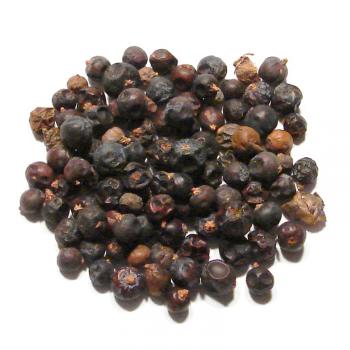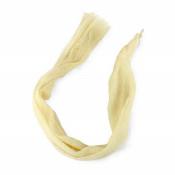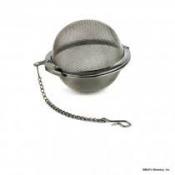 | Juniper Berries SKU: F-JB-BS-xx Price: $2.99 |
Juniper Berries are the principal flavor in Gin and a polarizing flavor at that. They have been used in folk medicine remedies for arthritis and are very popular additions to Holiday beers in Northern Europe.
The mature, dark berries are usually but not exclusively used in cuisine. The dried berries should be crushed well just before using as the flavor will decline rapidly once exposed to the air - three or four of the berries will flavor most dishes without overpowering the main ingredient or other seasonings.
Did you know that juniper berries are what give the alcohol "gin" their flavor? The word "gin" is a corruption of genièvre, the French word for junip. Gin is generally flavored with fully grown but immature green berries.
Making bathroom gin:
The term, bathroom gin, might be used loosely for any amateur distilled spirits, like moonshine. Making a relatively authentic, but safe, batch of bathtub gin is not very difficult. Combine portions of distilled water and strong grain alcohol in a sealable container that yields a proof range of 72 to 90. Add to this about 10 grams of dried juniper berries (cracked or crushed) and two grams of orange or lemon peel per 750 mL of liquid. Cover the jar and store in a cool, dark place for two days to one week depending on how much flavor you want to infuse. Shake daily. Strain or filter the finished product.
Other common botanicals used in making gin include:
coriander, bitter almonds, angelica root, liquorice root, cassia, cardamon, calamus root, orris root, grains of paradise.
Brewing with juniper:
Your can used both the branches and the berries to impart a bitter-sweet aroma of gin and slight burning sensation on the palate.
Juniper ales is the traditional brews of Scandinavia. There are several methods employed by breweries in using juniper which include one or more or all of the these additions:
to the mash;
to the boil;
after the boil
Since Rouge Brewery protects the usage of juniper, Juniper Pale Ale, we have to get a creative in trying to clone their recipe. Just remember to crack or crush the berries.
The mature, dark berries are usually but not exclusively used in cuisine. The dried berries should be crushed well just before using as the flavor will decline rapidly once exposed to the air - three or four of the berries will flavor most dishes without overpowering the main ingredient or other seasonings.
Did you know that juniper berries are what give the alcohol "gin" their flavor? The word "gin" is a corruption of genièvre, the French word for junip. Gin is generally flavored with fully grown but immature green berries.
Making bathroom gin:
The term, bathroom gin, might be used loosely for any amateur distilled spirits, like moonshine. Making a relatively authentic, but safe, batch of bathtub gin is not very difficult. Combine portions of distilled water and strong grain alcohol in a sealable container that yields a proof range of 72 to 90. Add to this about 10 grams of dried juniper berries (cracked or crushed) and two grams of orange or lemon peel per 750 mL of liquid. Cover the jar and store in a cool, dark place for two days to one week depending on how much flavor you want to infuse. Shake daily. Strain or filter the finished product.
Other common botanicals used in making gin include:
coriander, bitter almonds, angelica root, liquorice root, cassia, cardamon, calamus root, orris root, grains of paradise.
Brewing with juniper:
Your can used both the branches and the berries to impart a bitter-sweet aroma of gin and slight burning sensation on the palate.
Juniper ales is the traditional brews of Scandinavia. There are several methods employed by breweries in using juniper which include one or more or all of the these additions:
to the mash;
to the boil;
after the boil
Since Rouge Brewery protects the usage of juniper, Juniper Pale Ale, we have to get a creative in trying to clone their recipe. Just remember to crack or crush the berries.
| No reviews for this product.
|
|
||||
|









